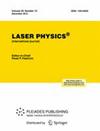Low-power infrared laser on survival, proliferation, and reactive oxygen species levels in Escherichia coli cultures
IF 1.1
4区 物理与天体物理
Q4 OPTICS
引用次数: 0
Abstract
Laser devices are light sources that emit monochromatic, coherent, and collimated electromagnetic radiation beams. Low-power lasers are widely used to treat clinical conditions based on the photobiomodulation effect. Despite therapeutic applications, mainly in continuous waves, limited data are available on photobiomodulation effects induced by low-power lasers in the pulsed emission mode. Thus, the aim of this study was to evaluate the effects of a low-power pulsed infrared laser on survival, proliferation, DNA damage, and reactive oxygen species (ROS) levels in低功率红外激光对大肠杆菌培养物存活、增殖和活性氧水平的影响
激光设备是发射单色、相干和准直电磁辐射光束的光源。基于光生物调制效应,低功率激光被广泛用于治疗临床疾病。尽管主要应用于连续波治疗,但有关脉冲发射模式下低功率激光诱导的光生物调制效应的数据却十分有限。因此,本研究旨在评估低功率脉冲红外激光对大肠杆菌细胞存活、增殖、DNA 损伤和活性氧(ROS)水平的影响。将大肠杆菌 C600 培养物和 pUC19 质粒暴露在低功率脉冲(5000 Hz)红外线(904 nm)激光(1.1、2.3 和 4.6 J)下。细菌存活率通过存活分数进行评估,细菌增殖通过测量细菌菌落面积进行评估,DNA损伤通过电泳后琼脂糖凝胶中的质粒图谱进行评估,ROS水平通过流式细胞术进行评估。结果表明,以脉冲发射模式照射低功率红外激光不会改变大肠杆菌 C600 的增殖和细菌质粒的电泳图谱,但会降低大肠杆菌 C600 培养物的存活率并增加 ROS 水平。
本文章由计算机程序翻译,如有差异,请以英文原文为准。
求助全文
约1分钟内获得全文
求助全文
来源期刊

Laser Physics
物理-光学
CiteScore
2.60
自引率
8.30%
发文量
127
审稿时长
2.2 months
期刊介绍:
Laser Physics offers a comprehensive view of theoretical and experimental laser research and applications. Articles cover every aspect of modern laser physics and quantum electronics, emphasizing physical effects in various media (solid, gaseous, liquid) leading to the generation of laser radiation; peculiarities of propagation of laser radiation; problems involving impact of laser radiation on various substances and the emerging physical effects, including coherent ones; the applied use of lasers and laser spectroscopy; the processing and storage of information; and more.
The full list of subject areas covered is as follows:
-physics of lasers-
fibre optics and fibre lasers-
quantum optics and quantum information science-
ultrafast optics and strong-field physics-
nonlinear optics-
physics of cold trapped atoms-
laser methods in chemistry, biology, medicine and ecology-
laser spectroscopy-
novel laser materials and lasers-
optics of nanomaterials-
interaction of laser radiation with matter-
laser interaction with solids-
photonics
 求助内容:
求助内容: 应助结果提醒方式:
应助结果提醒方式:


